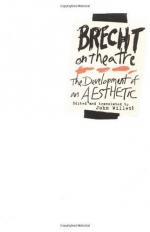
|
| Name: _________________________ | Period: ___________________ |
This test consists of 15 multiple choice questions and 5 short answer questions.
Multiple Choice Questions
1. How did Brecht characterize Shaw's work in "A Catching Infection: Fun"?
(a) As ego-driven.
(b) As extraordinarily healthy.
(c) As addictively engrossing.
(d) As tediously pedantic.
2. Piscator's Theater am Nollendorfplatz was based on _____ principles.
(a) Marxist.
(b) Aristotelian.
(c) Capitalist.
(d) Communist.
3. Brecht states that opera cannot be wished away and its _____ have an important social function.
(a) Morals.
(b) Truths.
(c) Illusions.
(d) Emotions.
4. Which work by Goethe was better as a book than a theatrical production, according to Brecht?
(a) Faust.
(b) Der Erlkönig.
(c) Der Zauberlehrling.
(d) Iphigenie auf Tauris.
5. What is the main task of epic theatre?
(a) To exaggerate.
(b) To mask.
(c) To report.
(d) To emote.
6. What is the name of Peter Lorre's character, the packer in Mann ist Mann?
(a) Ton Ton.
(b) Gay Gay.
(c) Macbeth.
(d) Macheath.
7. Brecht states that when an actor sings, he undergoes a change of _____.
(a) Rhythm.
(b) Worth.
(c) Scene.
(d) Function.
8. What did Brecht win in 1922 for Trommeln in der Nacht?
(a) An Oscar.
(b) The Nobel Prize.
(c) The Kleist Prize.
(d) A Tony Award.
9. What is the name of the Mother in Die Mutter?
(a) Helge.
(b) Vlassova.
(c) Misha.
(d) Elena.
10. _____ is fifteen volumes of Brecht's writings published by Kiepenheuer, Berlin.
(a) Verstehen.
(b) Versuche.
(c) Kontakt.
(d) Arbeiten.
11. Which aspect of epic theatre added statistical material?
(a) Paintings.
(b) Leaflets.
(c) Projections.
(d) A narrator.
12. Elisabeth Begner and Rudolf Forster starred in Shaw's _____ in 1924.
(a) Major Barbara.
(b) Man and Superman.
(c) Saint Joan.
(d) Widowers' Houses.
13. In "Last Stage: Oedipus", Brecht says that the future of Germany's theatre is _____.
(a) Philosophical.
(b) Religious.
(c) Non-existent.
(d) Tragic.
14. In reference to film, Brecht felt that the mechanization of literary production cannot be _____.
(a) Anticipated.
(b) Detached.
(c) Thrown into reverse.
(d) Thrown off a cliff.
15. What does the word 'Spass' mean in German?
(a) Long.
(b) Free.
(c) Fun.
(d) Classical.
Short Answer Questions
1. Die Mutter is a piece of anti-metaphysical, materialistic, _____drama.
2. _____ are Brecht's collected poems.
3. Die Mutter is based on whose novel, Mother?
4. Who was the interviewer in "Conversations with Bert Brecht"?
5. Who were Brecht's Frankfurt publishers?
|
This section contains 323 words (approx. 2 pages at 300 words per page) |

|




